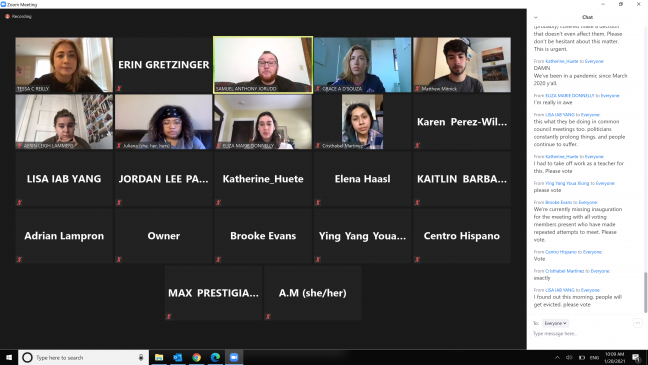The University of Wisconsin Reserve Board voted to sponsor legislation to create a COVID-19 Student Relief Fund on Wednesday following debate about legality concerns.
The five-member Reserve Board unanimously voted in favor to sponsor the COVID-19 Student Relief Fund legislation up for approval by the Associated Students of Madison student council on Jan. 26. Over a dozen students attended the meeting, with a majority of speakers voicing their support during a public comment period and in the Zoom chat section.
ASM to propose COVID-19 Student Relief Fund for direct student aid
The proposed fund would allocate between $2 million and $4 million to aid students facing housing insecurity with rent and utilities costs during the pandemic. The legislation for the fund is currently sponsored by five city council representatives, State Rep. Francesca Hong (D-Madison) and several ASM representatives.
The COVID-19 Relief Fund was the only item up for discussion at the Reserve Board’s first meeting in months. Dane County District 5 Supervisor Elena Haasl — who helped draft the legislation — said the proposal lays out the use of the funds in a way that will easily and effectively aid students.
“I think we are presented a unique opportunity to give back to students, give back to our friends … during this extremely uncertain and difficult time,” Haasl said. “So I really ask the Reserve Board to consider co-sponsoring this, to consider supporting this and really stand by students and use these idle funds to give back and to help out our community.”
While the fund would be available to all students, priority would be given to students who demonstrate unexpected financial burden as well as those not eligible for funds from the federal CARES Act — including undocumented students, DACA recipients and international students.
Several students also noted the fund would alleviate stress from the community because federal funds currently going to eligible students would be freed up for other community members.
Students also discussed the need to address housing insecurity, especially amid the pandemic. A UW Climate survey found 12% of students face housing or food insecurity on campus. ASM alumna Brooke Evans said at the meeting she experienced homelessness as a student and urged the Board to help students facing these livelihood insecurities as she once did.
“I have lifelong trauma that I’m unsure I’ll ever be able to recover from, as well as student debt that has sunk me to the point of not being able to afford housing anymore,” Evans said. “One of the most progressively accountable things you can do is to act on the principle that college should not be inaccessible to folks who were born poor.”
ASM Chair Matthew Mitnick provides insight on spring semester plans
Student Services Finance Committee Chair Tessa Reilly and SSFC Vice Chair Grace D’Souza voiced their support for the legislation, though they raised concerns about the legality and logistics of the fund. Many of their questions revolved around the UW System Administrative Policy 820 on the allocation of segregated fees and the amount of money that must be left in the reserve funds.
Former SSFC Chair Jordan Paisburg said during the public comment section that he looked into allocating reserve funds in a similar manner last spring amid the pandemic, but encountered difficulties with UW System policies that dictate segregated fees may not be allocated as “gifts and donations” individually to any student.
While the Board did vote and pass the proposal by the end of the meeting, Reilly and D’Souza advocated for insurance that the legislation was legal and feasible before they sponsored it.
“I think everyone’s on board with the situation and what’s going on, and everyone wants this to pass, but I would feel negligent in my duties if I pass this legislation, and then we hear from Bascom that it’s actually not allowed,” D’Souza said. “I think if we can use this time to really collaborate and make sure this is solid, and we can get this through Bascom.”
In the comment section, other student observers rebuked the concerns of D’Souza and Reilly. Some individuals urged them to consider the needs of students first, specifically student populations already marginalized on campus. Others asked the Board to sponsor the legislation immediately and allow issues of legality and policy to be solved when it reached UW administrators.
Mitnick also said the current sponsors of the legislation believe concerns about the segregated fees policy are addressed in their argument. Since funds from the COVID-19 Student Relief Fund would be administered through an existing contract with the Tenant Resource Center directly to landlords and housing agencies, Mitnick said this interpretation adheres to the UW System policies referenced by the SSFC members.
UW to reverse policy barring compensation for international telecommuting student workers
In a written statement to The Badger Herald, Mitnick said the next step in the approval process will be at ASM on Jan. 26. UW administrators have not yet signaled their official stance on the fund, Mitnick said. If the legislation passes, ASM will ask for Chancellor Rebecca Blank’s official approval at their meeting on Feb. 9.
“I am disappointed with some of my colleagues for debating students’ lives and questioning the validity of the proposal, but am glad we got the Reserve Board to support this,” Mitnick said in the statement. “If Christina Olstad, Lori Reesor and other administrators claim to want to uplift and help their students, then we look forward to their future support.”














